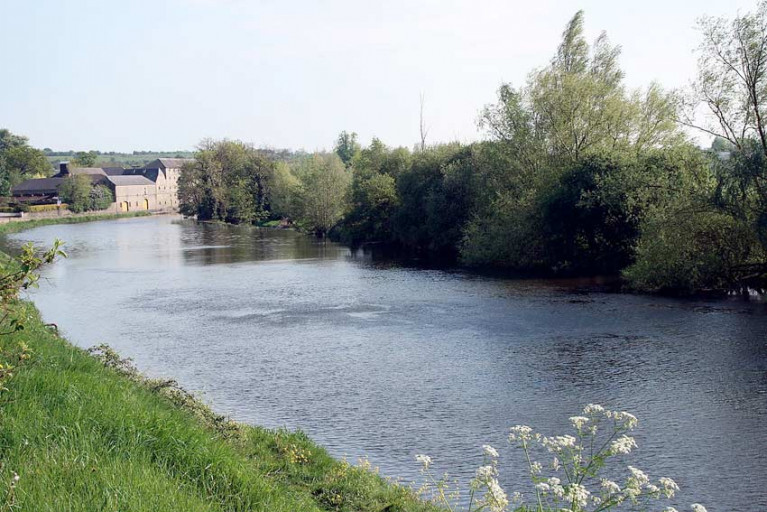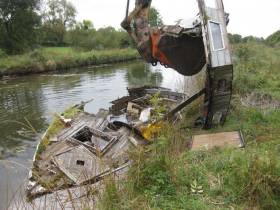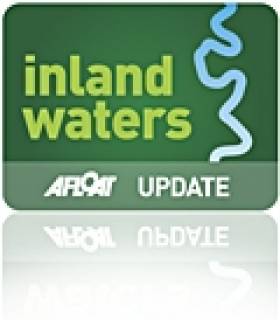Displaying items by tag: Barrow Line
Barrow Line Lock at Athy Closed for Emergency Repairs
Waterways Ireland advises masters and owners of vessels that Lock 26 on the Barrow Line of the Grand Canal, at Athy in Co Kildare, has been closed to navigation until further notice for essential maintenance and repairs.
Waterways Ireland advises all masters of vessels and inland waterways users of the Shannon Navigation, Shannon-Erne Waterway, Grand Canal, Royal Canal, Barrow Line and Barrow Navigation that these waterways will reopen from Monday 10 May in line with the latest relaxation in pandemic restrictions.
On the Shannon Navigation and Shannon-Erne Waterway, the winter mooring period will end on this date and the five-day mooring rule will be in force.
Locks on will be open normal summer hours (9am to 8.30pm on weekdays, 9am to 6pm on Sundays on the Shannon Navigation; 9am to 8pm daily on the Shannon-Erne) and service blocks will also reopen.
An exception applies to the lock gates at Tarmonbarry on the Shannon Navigation, which remain closed for continued emergency repair works until Friday 28 May. Passage through the lock will not be possible during this period but an alternative route via the Camlin River is available.
No lock passage tolls will be collected in order to facilitate social distancing. Note that a smart card is required to operate locks on the Shannon-Erne Waterway and these can be purchased from Waterways Ireland’s online shop or from designated retails outlets along the waterway.
Shannon Navigation lock-keepers are available at the following phone numbers:
- Lough Allen Canal - 071 964 1552
- Clarendon Lock - 071 966 7011
- Albert Lock - 071 963 7715
- Rooskey Lock - 071 963 8018
- Tarmonbarry Lock - 043 332 6117
- Athlone Lock - 090 649 2026
- Poolboy Lock - 090 964 4938
- Victoria Lock - 057 915 1359
- Portumna Bridge - 090 974 1011
- Ardnacrusha - 061 344 515
- Sarsfield Lock - 087 797 2998
Anyone who require assistance along the Shannon-Erne Waterway, meanwhile, is directed to contact the following:
- Ballyconnell Waterway Patroller - 087 260 3662
- Kilclare Waterway Patroller - 087 260 3663
Normal summer hours will also apply to locks on the Grand Canal, Royal Cabal, Barrow Line and Barrow Navigation.
Electricity and water services have been reconnected at all Waterways Navigations in the Republic, and normal pump-out facilities are available for boaters.
Visitors to the waterways are urged to be aware of other users and continue to observe social distancing protocols, keen a distance of at least two metres from others.
Waterways Ireland also notes that water levels are becoming low due to the recent period of low rainfall. In addition, normal maintenance weed-cutting of navigation channels has been late in starting due to the ongoing restrictions, so additional weed growth can be expected in the navigation channels.
Masters are asked to contact the local waterway patroller for updated information if wishing to navigate a particular area.
Planned Removal Of Vessels From Barrow & Royal Canal Later This Month
Owners of boats without permits on the Barrow Line of the Grand Canal and the Barrow Navigation face the removal of their vessels by Waterways Ireland later this month.
They are among the boats in contravention of bye-laws that will be taken from these inland waterways from Monday 26 October.
Others include vessels that appear abandoned, are double moored and/or causing obstruction (sunk) or are deemed to be or likely to cause a hazard to navigation, as per the Canal Act 1986 (Bye-Laws) 1988.
Owners of boats on the Royal Canal have been similarly advised of plans to remove non-permitted, abandoned or obstructing vessels from Monday 9 November.
Similar to last month’s planned boat removal on the Grand Canal, affected vessels have been stickered with warning notices, given suitable access, and owners — where known — have been contacted, Waterways Ireland says.
This story was updated on Wednesday 14 November with additional details about Royal Canal boat removals.
Sunken Craft Removed From the Barrow Line of the Grand Canal
The salvage and disposal of a number of sunk and abandoned vessels from the Barrow Line of the Grand Canal at Lowtown took place on 12-13 October 2016 by Waterways Ireland.
As part of the canals clean up a number of sunken and abandoned, non permitted, vessels were targeted for removal and disposal from the canals. Every effort was made to trace owners of the vessels via the permit database, Shannon Registration number or local knowledge. No owners or interested parties were found.
Upon inspection of all vessels by the Assistant Inspector of Navigation, it was determined that none of the vessels were salvageable and were beyond economic repair. Consequently it was decided to remove and dispose of the wrecks. A company was contracted to undertake the work.
The first vessel, a steel hulk has been sunk on the Eastern bank of the Barrow Line for approximately 5 years. Accumulated debris and rubbish hindered the pump out but eventually the vessel was floated. The vessel was recovered onto the canal bank after 7 hours of work. As initial cuts with cutting equipment were made, Waterways Ireland received a request from Heritage Boat Association to pause the removal of the vessel as it potentially had heritage value. No further cutting was done and the hulk has been left on the canal bank, overturned to prevent further ingress of water, while the HBA's interest is followed up.
Removal of the other vessels went ahead as planned. Most vessels broke up as they were being towed to the Western bank for disposal. A diver in the water recovered all floating debris and heavy materials were recovered with the assistance of a digger bucket.
One vessel was pumped out and returned to its owner who was identified after a number of phone calls on 13th October.
Vessel removal was completed on 13th October with contractor returning on site on 14th October to "dress" the bank and remove any remaining debris.
Waterways Ireland requests owners of boats on the Grand Canal, Royal Canal and Barrow Navigation to ensure they have a valid permit and that the Inspector of Navigation has been provided with up to date contact details.
Barrow Line Closes to Facilitate Dredging
Waterways Ireland have advised all owners and masters of inland waterways vessels that the Barrow Line of the Grand Canal between the 21st Lock at Ballyteague and the 22nd Lock at Glenaree, will be closed to navigation from 16th Nov 2010 until 17th Mar 2011 to facilitate Waterways Ireland's winter dredging programme.































































